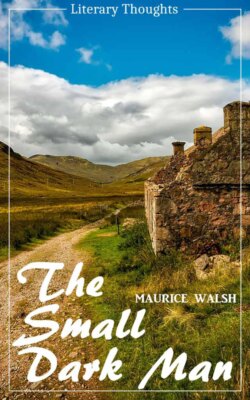Читать книгу The Small Dark Man (Maurice Walsh) (Literary Thoughts Edition) - Maurice Walsh - Страница 5
На сайте Литреса книга снята с продажи.
ОглавлениеII
The shop was one step down from the street. It was wide and low, and, after the glare of the white road, dusky and cool and with a pleasantly mixed odour of raisins, tobacco, nutmeg, bacon, leather, and toilet soap. A wonderful shop containing everything that a man could need, down to spare washers for soda-water syphons. The post-office business was confined to a high-railed corner near the door, and in there the postmaster slipped and, after fumbling through a unique disarray of official papers, tendered a telegraph form.
The small man did not hesitate over his wire, running it off in one scrawl and not pausing to count the words. “There,” he said, sliding the form across the counter. “That will apprise Tearlath that I am here and coming.”
The postmaster fitted on his spectacles and read it aloud slowly: “Charles Grant, Innismore Lodge, Balwhinnie. Coming over the hill on two feet, Tearlath son. Six leather suit-cases, steamer trunk, and hat-box at the station. Get them.—Aodh MacFirbis.”
The Highlandman, head bent, looked over his spectacles at the small man and hid well his surprise and unbelief. He had already noted the uncreased flannel trousers with the careless triangular rent at the side of a knee, the Donegal tweed jacket so unmistakably hand-me-down, the cheap mat shirt—clean undoubtedly, but collarless and unbuttoned at the neck, and a good neck too, long and broad-throated, finely brown above and with a film of black hair in the white V of the breast—and the brand-new, furry-black velour hat aslant on the back of the head and over one ear. Across one arm was an old burberry, and under the same a seasoned ash-plant.
The postmaster looked again at the wire and wondered. Six leather suit-cases, a steamer trunk, and a hat-box!
“Well you may doubt it,” said the small man agreeably. “The one case that’s in it looks like leather anyway. You see that’s the sort of wire Tearlath would be expecting, and far be it from me to disappoint him or any man. Money it costs me often.”
“Wicked waste in a telegram,” said the Scot, pencil running along the words. “Suit-cases! Hat-box! Wonder do them words count two or four?”
“Hit an average.”
“Long enough as it is. I’ll warrant the Postmaster-General will let me know about it if I’m wrong.” He lifted his blue eyes and hot grievance flashed in them. “Them Post-Office people are a dam’ nuisance,” he said warmly.
“Not every one of you.”
“Accounting and reckoning and explaining even on—and me a busy man. A shilling or sixpence, ay, or a bawbee more or less, and down comes a yellow sheet long as that, and another after it, and a ’phone message like as not, and will I explain this and will I explain that, and t’ither—and about nothing at all. A penny too much, and couldn’t I be using a stamp when I need it? A sixpence out, and couldn’t they be taking it off the few pounds they pay me?—” He stopped, and a slow smile crinkled his face. “Man,” he said in a changed tone, “I’m sometimes tempted to write them the letter the Sutherland man wrote them.”
“It would be a useful letter. There’s a Board in Dublin often troubles me——”
“I’d warn you against using it. The old fellow had a post-office like myself and the same bother with it, and in the heel of a temper he sat down and wrote a word to the Postmaster-General. ‘Dear Mister Postmaster-General, you and your post-office can go to hell.’ That was it.”
“It was enough,” said the small man solemnly. “Brief and with the devil’s own kick.”
“Ay, and they took the post-office from him.” The Highlandman threw the subject behind him with a lift of one shoulder. “Ye ken the laird of Innismore?” he inquired.
“Young Tearlath? Fine that. Himself and myself and a fellow by the name of Allenby captured Jerusalem together, and two of us got no credit for it. I am for over this hill of yours to spend a week or two with him.”
“The long, hard road you’re on.”
“Wait, now. I was coming up the Highland Line reading a guide-book and Sir Walter Scott and looking over a route map. There I was, in a coop of a railway carriage, going down to a place called Muiryside and changing there for a place called Dalbeallachie—that how you call it?—Yes, Dalbeallachie! and changing there for Balwhinnie, and a long dozen miles short of Innismore at the end. Whilst outside was the sun shining, and the moors lifting, pinewoods on the slopes and a white road winding, and Innismore over there, twenty miles as the crow flies. So here I am. Well?”
“That crow would need the wing of an eagle,” said the postmaster. “Did you reckon the miles set up on end?”
“I could see them, and I come from a land of hills.”
“Out of Ireland you’ll be?”
“Whether you hold it against me or not, but I used to be taken for a Jew in Palestine.”
The postmaster looked at the wire that was in no hurry to go. “Aodh MacFirbis,” he murmured.
“Hugh Forbes you would say in the English.”
“I ken, I ken. The Forbes is a good Scots clan—Tomintoul way.”
“And a good Irish clan, too—though not so good, maybe. There are many of the name where I bide, and that’s Glounagrianaan—the sunny glen—where the brown hills rise up on either hand like the blue hills of Donegal.”
“Not hills like Cairn Ban?”
“Not so big, but big enough. And what is one hill—or two hills—to a hillman in a long summer’s day?”
“Ay so,” agreed the postmaster.
